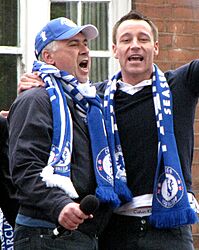Carlo Ancelotti facts for kids
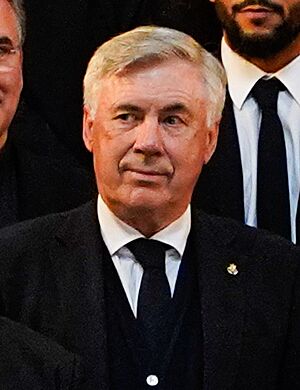
Ancelotti in 2022
|
||||||||||||||||
| Personal information | ||||||||||||||||
|---|---|---|---|---|---|---|---|---|---|---|---|---|---|---|---|---|
| Full name | Carlo Ancelotti | |||||||||||||||
| Date of birth | 10 June 1959 | |||||||||||||||
| Place of birth | Reggiolo, Italy | |||||||||||||||
| Height | 1.79 m (5 ft 10 in) | |||||||||||||||
| Position(s) | Midfielder | |||||||||||||||
| Team information | ||||||||||||||||
|
Current team
|
Brazil (head coach) | |||||||||||||||
| Youth career | ||||||||||||||||
| 1973–1975 | Reggiolo | |||||||||||||||
| 1975–1976 | Parma | |||||||||||||||
| Senior career* | ||||||||||||||||
| Years | Team | Apps | (Gls) | |||||||||||||
| 1976–1979 | Parma | 55 | (13) | |||||||||||||
| 1979–1987 | Roma | 171 | (12) | |||||||||||||
| 1987–1992 | AC Milan | 112 | (10) | |||||||||||||
| Total | 338 | (35) | ||||||||||||||
| International career | ||||||||||||||||
| 1980 | Italy U-21 | 3 | (0) | |||||||||||||
| 1979–1989 | Italy Olympic | 11 | (1) | |||||||||||||
| 1981–1991 | Italy | 26 | (1) | |||||||||||||
| Managerial career | ||||||||||||||||
| 1995–1996 | Reggiana | |||||||||||||||
| 1996–1998 | Parma | |||||||||||||||
| 1999–2001 | Juventus | |||||||||||||||
| 2001–2009 | AC Milan | |||||||||||||||
| 2009–2011 | Chelsea | |||||||||||||||
| 2011–2013 | Paris Saint-Germain | |||||||||||||||
| 2013–2015 | Real Madrid | |||||||||||||||
| 2016–2017 | Bayern Munich | |||||||||||||||
| 2018–2019 | Napoli | |||||||||||||||
| 2019–2021 | Everton | |||||||||||||||
| 2021–2025 | Real Madrid | |||||||||||||||
| 2025– | Brazil | |||||||||||||||
|
Medal record
|
||||||||||||||||
| *Club domestic league appearances and goals | ||||||||||||||||
Carlo Ancelotti is a famous Italian football manager and former player. He was born on June 10, 1959. People call him "Carletto" in Italy and "Don Carlo" in Spain. Many consider him one of the best football managers ever.
Ancelotti has won the UEFA Champions League five times as a manager, which is a record! He is also the only manager to win league titles in all of Europe's top five leagues. He has won the FIFA Club World Cup three times and the UEFA Super Cup five times.
As a player, Ancelotti won two European Cups with AC Milan in 1989 and 1990. This makes him one of only seven people to win the European Cup/Champions League as both a player and a manager. He played as a midfielder. He started his career with Parma and helped them get promoted. Later, he played for Roma, winning a Serie A title and four Coppa Italia titles. With AC Milan, he won two Italian league titles and two European Cups. He also played 26 times for the Italian national team. He played in two FIFA World Cups and the UEFA Euro 1988. Italy finished third in the 1990 FIFA World Cup.
As a manager, Ancelotti coached Reggiana, Parma, and Juventus before joining AC Milan in 2001. At Milan, he won the Champions League and the Coppa Italia in 2003. The next season, he won the Italian league title. In 2007, he won his second Champions League with Milan. He was named Serie A Coach of the Year twice.
In 2009, Ancelotti became the manager of Chelsea. In his first season, he won both the Premier League and the FA Cup. He then managed Paris Saint-Germain in France, winning their first Ligue 1 title in 19 years in 2013. After that, he moved to Real Madrid. In his first year, he led Real Madrid to their tenth Champions League title and a Copa del Rey title. He also managed Bayern Munich, Napoli, and Everton. He returned to Real Madrid in 2021 and won two more Champions League titles in 2022 and 2024. In 2025, he became the head coach of the Brazil national team.
Contents
Playing Career Highlights
Starting at Parma
Carlo Ancelotti began his football journey in 1974 with Parma. He made his first professional appearance in 1976 at 18 years old. He played as an attacking midfielder and scored many goals. Carlo helped Parma get promoted to Serie B in 1979. In a key play-off match, he scored two goals to secure their promotion.
Success with Roma
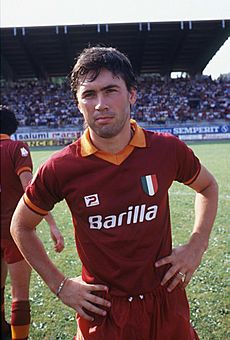
In 1979, Ancelotti joined Roma. He quickly became a key player, often playing as a winger or central midfielder. He won the Coppa Italia four times with Roma (1980, 1981, 1984, and 1986). In 1983, he helped the team win the Serie A title, which was only their second league title ever.
He also helped Roma reach the European Cup final in 1984. However, he missed the final due to an injury. Roma lost that match to Liverpool. In 1985, he became the team's captain.
Joining AC Milan
From 1987 to 1992, Ancelotti played for AC Milan. He was a very important part of the team that won many titles. These included the Serie A title in 1988 and two European Cups in a row in 1989 and 1990. They also won two European Super Cups and two Intercontinental Cups.
Milan had amazing players like Paolo Maldini, Franco Baresi, Frank Rijkaard, Ruud Gullit, and Marco van Basten. One famous moment was when Ancelotti scored a powerful goal against Real Madrid in the 1989 European Cup semi-finals. He played the whole final match when Milan won 4-0.
He won another Serie A title with Milan in 1992, where the team went undefeated. However, ongoing knee injuries limited his playing time. He retired from playing at the end of that season when he was 33 years old. In his last game, he scored two goals and received a big cheer from the fans.
Playing for Italy
Carlo Ancelotti played for the Italian national team. He scored his first and only goal for Italy in 1981. He was supposed to play in the 1982 FIFA World Cup, but a knee injury stopped him. Italy went on to win that tournament.
He was part of Italy's squad for the 1986 FIFA World Cup, but he did not play. He also helped Italy reach the semi-finals of UEFA Euro 1988. Another injury kept him out of the 1988 Summer Olympics.
Ancelotti played in the 1990 FIFA World Cup held in Italy. An injury in the first game limited his appearances. He returned for the third-place match, helping Italy win 2-1 against England. He played a total of 26 games for Italy before retiring from international football in 1991.
How He Played
Ancelotti was a midfielder known for his leadership and smart play. Even though he wasn't the fastest or strongest, he was very talented and worked hard. He had great technical skills, understood tactics well, and could pass the ball accurately. He was also known for his powerful shots from outside the penalty box.
He could play in different midfield positions, often as a deep-lying playmaker. This meant he would get the ball back and then control the pace of the game. His playing career ended early at 33 due to several injuries.
Coaching Career
Starting with Reggiana
After working as an assistant coach for the Italian national team, Ancelotti started his managerial career. He took charge of Reggiana in 1995. In his first season, he helped the team get promoted to Serie A.
Coaching Parma
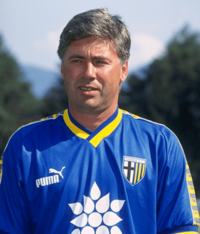
Ancelotti joined Parma in 1996. The team had many promising young players, including future stars Gianluigi Buffon and Fabio Cannavaro. Ancelotti changed the team's playing style. Parma finished second in Serie A in 1997, which earned them a spot in the UEFA Champions League.
He left Parma after the 1998 season.
Time at Juventus
In 1999, Ancelotti became the manager of Juventus. He changed his tactics to fit star player Zinedine Zidane into the team. Juventus reached the semi-finals of the UEFA Champions League in 1999.
In his first full season, he won the UEFA Intertoto Cup with Juventus. However, they lost the Serie A title by just one point on the last day. The next season, Juventus finished second in the league again, and Ancelotti was dismissed in June 2001.
Leading AC Milan to Glory
Ancelotti became AC Milan's manager in November 2001. He helped Milan qualify for the Champions League in his first season. In the 2002–03 season, he made important changes to the team. He moved Andrea Pirlo to a deeper midfield role, which helped the team's creative play.
Milan won the Champions League final in 2003, beating Juventus on penalties. They also won the Coppa Italia. The next season, with the addition of Kaká, Milan won the UEFA Super Cup and the Serie A title in 2004.
In 2007, Milan won their second Champions League title under Ancelotti. They beat Liverpool in the final, getting revenge for a loss two years earlier. He also won the FIFA Club World Cup in 2007. Ancelotti left Milan in May 2009, after being their longest-serving manager at the time.
Managing Chelsea
On June 1, 2009, Ancelotti became the new manager of Chelsea. In his first season, he led Chelsea to win both the Premier League title and the FA Cup. This was Chelsea's first time winning both in the same season. His team scored 103 goals in the Premier League, a new record.
The next season, Chelsea started strong but then had some tough results. Ancelotti was dismissed in May 2011, after Chelsea finished second in the league.
Time at Paris Saint-Germain
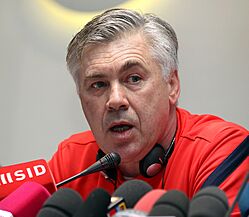
Ancelotti took over Paris Saint-Germain in December 2011. In his first full season, he led the club to win their first Ligue 1 title in 19 years in May 2013. They also reached the quarter-finals of the UEFA Champions League. Ancelotti left PSG in May 2013 to join Real Madrid.
First Spell at Real Madrid
On June 25, 2013, Ancelotti became the manager of Real Madrid. He changed the team's formation, which helped players like Ángel Di María shine. In April 2014, he won his first trophy with Real Madrid, the Copa del Rey, by beating Barcelona.
On May 24, Real Madrid won their tenth Champions League trophy, called La Décima, after beating Atlético Madrid. Ancelotti became the first manager to win the Champions League/European Cup twice as a player and three times as a manager.
In 2014, his team set a Spanish record of 22 consecutive victories. They also won the UEFA Super Cup and their first FIFA Club World Cup. Real Madrid finished second in the league in 2015. Ancelotti was dismissed in May 2015, despite his successes. He decided to take a year off from coaching.
Coaching Bayern Munich

Ancelotti became the manager of Bayern Munich in July 2016. In August 2016, he won his first trophy with Bayern, the DFL-Supercup. In April 2017, he led Bayern to win their fifth consecutive Bundesliga title.
However, Bayern was eliminated from the Champions League by Real Madrid. Ancelotti was dismissed in September 2017 after a loss to Paris Saint-Germain.
Napoli and Everton
In May 2018, Ancelotti was appointed head coach of Napoli. Napoli finished second in Serie A in his first season. He was dismissed in December 2019, even though Napoli had just qualified for the Champions League knockout stage.
On December 21, 2019, Ancelotti became the manager of Everton. He signed former players James Rodríguez and Allan. Everton started the 2020–21 season very well, winning seven games in a row. Ancelotti was named Premier League Manager of the Month for September 2020. Everton finished the season in 10th place.
Return to Real Madrid

On June 1, 2021, Ancelotti returned to Real Madrid. In his first season back, he won La Liga and the Supercopa de España. This made him the first manager to win all of Europe's top five leagues. He also led Real Madrid to win the Champions League again, his second with the club and record fourth overall. Real Madrid also achieved their fourth European double.
In the 2022–23 season, Ancelotti guided Real Madrid to a UEFA Super Cup victory. He also broke Alex Ferguson's record for most wins in the Champions League, with 103 victories. In February 2023, Real Madrid won their fifth FIFA Club World Cup trophy. They also won the Copa del Rey in 2023.
In the 2023–24 season, Ancelotti continued to break records. He became the first manager to make 200 appearances in the Champions League. Real Madrid won La Liga in May 2024. This was Ancelotti's twelfth title with the club, making him the second-most successful manager in Real Madrid's history. On June 1, 2024, Real Madrid defeated Borussia Dortmund 2-0 to win their 15th Champions League trophy, which was Ancelotti's fifth title in the competition. In August 2024, he won his record fifth UEFA Super Cup, becoming the joint most decorated coach in Real Madrid's history with 14 titles. In December 2024, he won his record-breaking 15th title with the club, the FIFA Intercontinental Cup.
In the 2024–25 season, Real Madrid faced Arsenal in the Champions League quarter-finals, losing 5-1 on aggregate. Domestically, they lost to Barcelona in the Supercopa de España final and the Copa del Rey final. Barcelona also won La Liga in May 2025. On May 23, 2025, Real Madrid announced that Ancelotti would leave the club at the end of the season.
Coaching Brazil
On May 12, 2025, the Brazilian Football Confederation announced Ancelotti as the new manager of the Brazil national team. This is his first time coaching a national team full-time. He made his debut on June 5, 2025, in a draw against Ecuador. His first win came on June 10, which helped Brazil qualify for the 2026 FIFA World Cup.
Personal Life
Carlo Ancelotti has two children, a daughter and a son named Davide. Davide has worked as his assistant coach at Everton and Real Madrid. Carlo Ancelotti is a Roman Catholic.
In 2009, Ancelotti's autobiography, Preferisco la Coppa (meaning "I Prefer the Cup"), was published. All the money from the book sales went to a foundation that researches a disease called amyotrophic lateral sclerosis. In 2014, he married Mariann Barrena McClay in Vancouver. In 2019, he became a grandfather to twins. In February 2021, his home was burgled, and a safe was stolen. In October 2023, he received an honorary doctorate from the University of Parma.
Honours
Player
Roma
- Serie A: 1982–83
- Coppa Italia: 1979–80, 1980–81, 1983–84, 1985–86
AC Milan
- Serie A: 1987–88, 1991–92
- Supercoppa Italiana: 1988
- European Cup: 1988–89, 1989–90
- European Super Cup: 1990
- Intercontinental Cup: 1989
Italy
- FIFA World Cup third place: 1990
Manager
Juventus
- UEFA Intertoto Cup: 1999
AC Milan
- Serie A: 2003–04
- Coppa Italia: 2002–03
- Supercoppa Italiana: 2004
- UEFA Champions League: 2002–03, 2006–07
- UEFA Super Cup: 2003, 2007
- FIFA Club World Cup: 2007
Chelsea
- Premier League: 2009–10
- FA Cup: 2009–10
- FA Community Shield: 2009
Paris Saint-Germain
- Ligue 1: 2012–13
Real Madrid
- La Liga: 2021–22, 2023–24
- Copa del Rey: 2013–14, 2022–23
- Supercopa de España: 2021–22, 2023–24
- UEFA Champions League: 2013–14, 2021–22, 2023–24
- UEFA Super Cup: 2014, 2022, 2024
- FIFA Club World Cup: 2014, 2022
- FIFA Intercontinental Cup: 2024
Bayern Munich
- Bundesliga: 2016–17
- DFL-Supercup: 2016, 2017
Individual Awards
- The Best FIFA Football Coach: 2024
- World Soccer Magazine World Manager of the Year: 2003
- Serie A Coach of the Year: 2001, 2004
- IFFHS World's Best Club Coach: 2007, 2014, 2022, 2024
- UEFA Men's Coach of the Year: 2021–22
- Globe Soccer Awards Best Coach of the Year: 2014, 2022
- Premier League Manager of the Month: November 2009, August 2010, March 2011, April 2011, September 2020
- La Liga Manager of the Month: October 2014, April 2015, August 2023, April 2024
- Italian Football Hall of Fame: 2015
See also
 In Spanish: Carlo Ancelotti para niños
In Spanish: Carlo Ancelotti para niños
 | Toni Morrison |
 | Barack Obama |
 | Martin Luther King Jr. |
 | Ralph Bunche |


